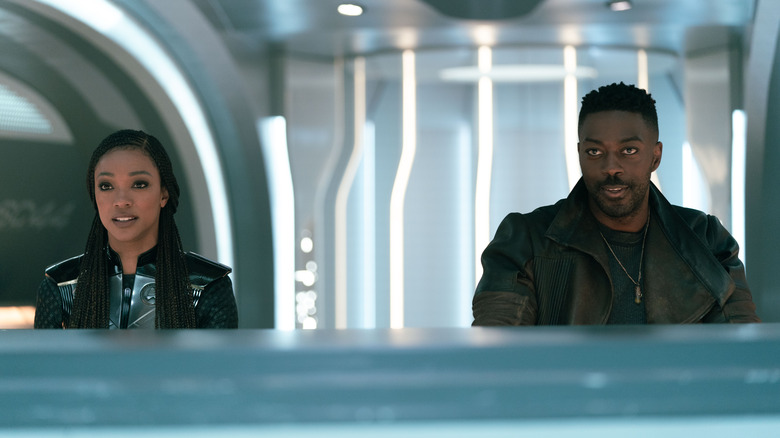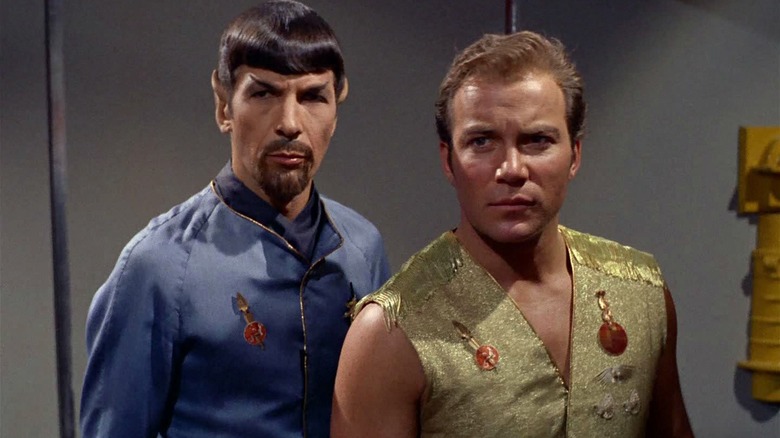Star Trek: Discovery Just Brought A Legendary Original Series Episode Back Into The Mix
Let's fly ... away from spoilers. Read no further if you haven't watched the latest episode of "Star Trek: Discovery."
Mirror, mirror on the wall, who's the strangest of them all? In "Star Trek," that title goes to one of the zaniest concepts ever introduced into the canon: The Mirror Universe. The idea of our alternate selves living completely different lives somewhere out there is no longer the sole domain of perhaps the nerdiest franchise in all of sci-fi (although shows like "For All Mankind," "Foundation," and "3 Body Problem" are creating some stiff competition), the Marvel Cinematic Universe, or the best episode of "Community" ever made. Fans might be surprised to find out that many in the scientific community believe the theory is worth discussion these days. But "Trek" put its own unmistakable fingerprints on the multiverse by emphasizing one in particular that stands at odds with the usual Prime Universe — one that poses a fundamentally moral dilemma between the paragons of Starfleet we know and love, and the absolute worst versions of themselves.
It doesn't come as a huge surprise that "Star Trek: Discovery" would use its final season to travel full circle and return to the Mirror Universe that played such a significant role back in season 1 (even if, ironically, there might be a parallel universe out there where we were able to see former showrunner Bryan Fuller's more complex and nuanced take on it). But what's sure to shock and delight longtime fans in episode 5, aptly titled "Mirrors," is a deep-cut reference to arguably one of the most influential hours of "Trek" ever made, and the one that introduced the Mirror Universe in the first place.
A different kind of black mirror
There might not be any sinister goatees or chest-baring V-necks in sight throughout this episode of "Discovery," but the lasting effects of "The Original Series" episode "Mirror, Mirror" are plain to see. Upon entering the wormhole that took scavengers Moll (Eve Harlow) and L'ak (Elias Toufexis) into multidimensional space, Captain Michael Burnham (Sonequa Martin-Green) and Book (David Ajala) discover the wrecked remains of their ship ... alongside the still-functioning husk of a familiar-looking Starfleet vessel, emblazoned with the name, "ISS Enterprise." For those who haven't brushed up on their 1967 "Trek" lore (and, quite frankly, shame on you if that's the case), Burnham helpfully points out that this isn't exactly the same starship captained by the fabled James T. Kirk thousands of years ago. It's one that has somehow found its way from the depths of the Mirror Universe (the exact specifics are oddly brushed aside) and remained stranded ever since.
But then "Discovery" goes a step further and hearkens back to "Mirror, Mirror" more thematically. While exploring the derelict ship, Burnham and Book stumble upon information about the previous occupants of the ISS Enterprise and specifically that of a certain Kelpian who rose from a slave to a leader in his own right. That, of course, refers to none other than the Mirror version of Saru (Doug Jones) seen in season 3, whom Emperor Georgiou (Michelle Yeoh) saved from certain death and pointed towards his proper path. Where the ending of "Mirror, Mirror" suggests that Mirror Spock is still "a man of integrity" despite the ruthlessness of the Empire he serves, "Discovery" reconfirms that even the comically rampant evil of the Mirror Universe is no match for the stubborn idealism of "Trek."
New episodes of "Star Trek: Discovery" stream on Paramount+ every Thursday.

